Iftar Timing in Dubai: A Comprehensive Guide
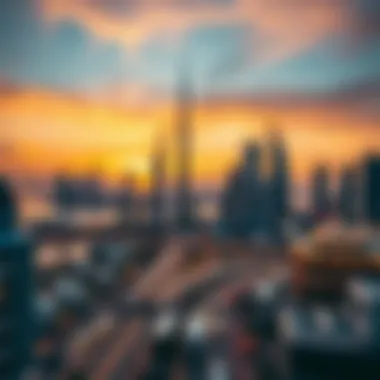

Intro
As the sun dips below the horizon, the bustling city of Dubai transforms. In this vibrant metropolis, the call to iftar echoes, marking the end of a day of fasting during the holy month of Ramadan. Iftar not only serves as a moment of nourishment, but it’s also deeply rooted in Dubai's social fabric and cultural heritage.
Understanding the timing of iftar is essential for both residents and visitors, as it varies throughout the month based on lunar observations. This guide provides a rounded perspective on iftar timing, shedding light on its significance, location-specific variations, and the various dining experiences available during Ramadan.
Here, we will explore how local customs intertwine with contemporary practices and how these timings influence community dining experiences. Whether you are looking to enjoy a meal with family, connect with community traditions, or find the best dining venues, knowledge of iftar timing allows for a richer Ramadan experience in Dubai.
Preface to Iftar Timing
Iftar timing holds a special significance in Dubai, especially during the holy month of Ramadan. It's more than just a meal; it symbolizes a moment of reflection, unity, and community spirit. As the sun sets, marking the end of a day of fasting, the anticipation of breaking the fast brings families and friends together, drawing on both tradition and modernity.
What makes this topic critical is not only its cultural importance but also the practical aspects that play a role in daily life during Ramadan. Understanding iftar timing affects how residents and visitors plan their evenings, whether they opt for home-cooked meals, dining out, or participating in community events. Additionally, knowledge of the timing enriches social interactions, allowing everyone involved to engage in this experience mindfully.
Definition of Iftar
Iftar is the meal that breaks the fast during Ramadan, traditionally starting with the consumption of dates and water. The term comes from the Arabic word "fatoor," which means to break a fast. In a literal sense, it marks the end of a day of restraint and devotion, setting the stage for both spiritual and communal activities as night falls.
During this time, Muslims gather around tables laden with a variety of dishes. While the cuisines may differ across cultures, the essence remains the same—sharing food with loved ones as a sign of gratitude. The time of iftar is typically aligned with the sunset, but variations can occur based on geographical locations and lunar observations.
The Importance of Iftar During Ramadan
The significance of iftar during Ramadan transcends the mere act of eating. It encompasses elements of tradition, spirituality, and social cohesion. During fasting, individuals experience not only a physical challenge but also an opportunity for mental purification and reflection. Once the sun sets, the act of eating together fosters a sense of belonging and community.
In Dubai, where cultures converge, the iftar meal often showcases a fusion of flavors, reflecting the diverse population. It offers an expression of hospitality that is deeply rooted in local customs. This becomes especially relevant in a society where expats and locals share their experiences, serving as a bridge to understanding religious practices and cultural nuances.
Moreover, gatherings during iftar can spark conversations around charity and community service. Many individuals take it upon themselves to feed those in need during this period—a practice that reinforces empathy and generosity. In essence, iftar is not just a break from fasting; it’s a collective experience that enriches everyone's lives.
"Iftar is where faith and community intertwine, making every sunset an occasion for gratitude and connection."
Understanding the timings and cultural underpinnings of iftar in Dubai not only enhances one’s experience during Ramadan but also deepens awareness of the city’s vibrant social fabric. This guide aims to shed light on these intricacies as we navigate through various aspects of iftar timing.
Understanding Islamic Calendar
The foundation of determining Iftar timing in Dubai lies in the Islamic calendar. It is paramount to comprehend how this lunar-based calendar operates, not just for religious observance but also for daily living during Ramadan. The Islamic calendar consists of 12 months, which are based on the phases of the moon. Each month can vary between 29 to 30 days, causing the calendar year to be about 10 to 12 days shorter than the Gregorian calendar. This is why Ramadan shifts annually, affecting when residents and visitors in Dubai can observe Iftar.
Lunar Observations and Timing
Lunar observations play a crucial role in defining the start and end of Ramadan. In many Muslim communities, people rely on the sighting of the moon to confirm the timing. The Islamic month begins with the sighting of the new crescent moon, making these observations significant. Local mosques often announce the sighting, which generates excitement—it’s a large part of the culture here. For those navigating the nuances of the Islamic calendar, understanding how lunar phases work can clarify Iftar timing. As Ramadan progresses, the timing of Iftar shifts slightly later each day because the sun sets at varying times.
Many residents might turn to mobile apps and online platforms to track these timings accurately. Some notable resources include the IslamicFinder and MuslimPro apps, which can even alert users as the sunset approaches. Knowing the exact lunar timing helps not only with the daily fasting ritual but also fosters community connection.
Factors Affecting Iftar Timing
Several elements can influence Iftar timing, and understanding these factors is essential for anyone living in or visiting Dubai during Ramadan. Some significant considerations include:
- Geographical Location: Different neighborhoods may deist misalignment on sunset timing, due to high-rise buildings or geographical features.
- Seasonal Changes: As Ramadan moves across the months, the sunset time varies significantly. Those fasting need to adapt their routines as the day length changes.
- Local Announcements: The variance between different mosques’ announcements can sometimes lead to confusion. It's important to check notices from local mosques to get the most accurate timing.
- Cultural Practices: Certain cultural practices may lead to slight deviations in when the community begins to break their fast, influenced by local customs or traditions.
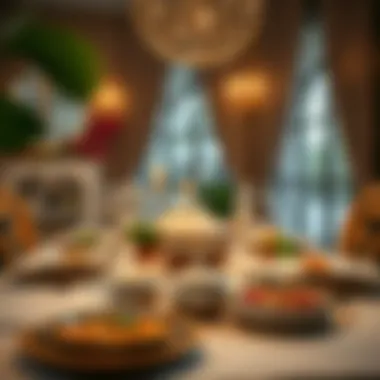
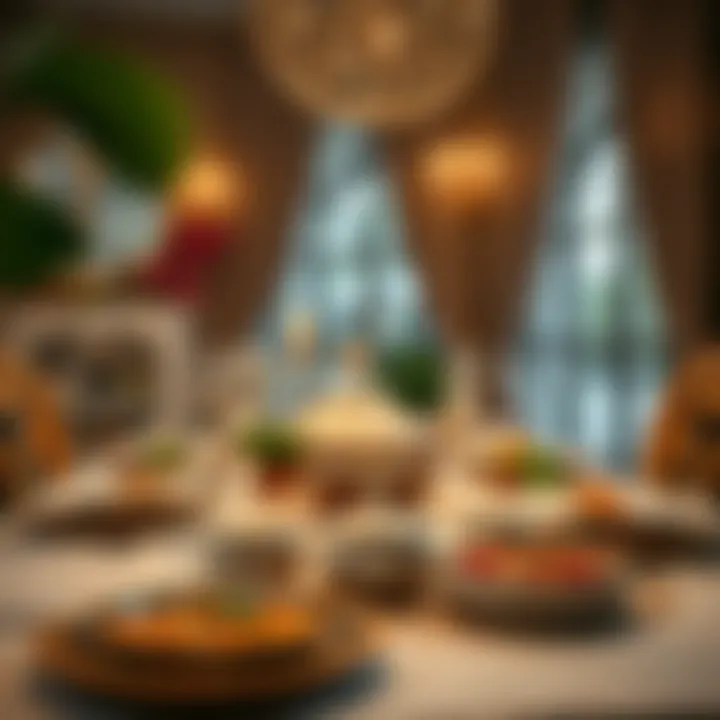
In summary, precise Iftar timing is far from a simple matter; it intertwines with astronomy, geography, and cultural practices, necessitating awareness and understanding throughout the month of Ramadan.
The intricacies of the Islamic calendar not only inform Iftar timing but also enrich the experience of Ramadan in Dubai, weaving together the threads of tradition and modernity, as community and faith intertwine.
Iftar Timing in Dubai
Iftar timing in Dubai holds significant importance during the month of Ramadan, marking a pivotal moment for both residents and visitors. The fast, observed from dawn until dusk, culminates in Iftar, which is the meal consumed after the sun sets. This moment is not just about breaking a fast; it serves as a reminder of community, tradition, and spirituality. Understanding the timing of Iftar can enhance the experience, ensuring that individuals partake in meals in harmony with the established cultural rhythms.
The timings of Iftar in Dubai are influenced by various factors, including the position of the sun, local customs, and religious practices. For expatriates and locals alike, knowing the correct Iftar time aids in planning gatherings and meals, fostering a sense of unity and respect for the holy month. Additionally, the city offers a diverse culinary landscape, and an awareness of when to break the fast can enhance dining experiences, encouraging exploration of Dubai's culinary delights.
General Iftar Timing Overview
The time to break the fast in Dubai typically coincides with the Maghrib prayer, which occurs right after sunset. The exact timing can vary throughout Ramadan, considering the lunar calendar and the specific geographical coordinates of the city.
During early Ramadan, Iftar may be around 6:45 PM, while approaching the end, it can shift past 7:00 PM. Most Islamic authorities and mosques in Dubai provide precise prayer times that include Iftar timings, helping the community synchronize their meals accordingly.
Many restaurants and hotels also partake in this practice, adjusting their services to welcome patrons just in time for Iftar. A broad array of options ranging from lavish buffets to simple family meals spring into life during the month, reflecting both local and global tastes.
Daily Variations in Timing
As Ramadan progresses, Iftar times in Dubai present daily variations. The sun sets later towards the end of the month, meaning that individuals must adjust their schedules accordingly. This changing nature requires attention from those observing the fast; many may turn to digital resources, community calendars, or mosque announcements to keep abreast of the precise time to break their fast.
The timing can also differ slightly across various neighborhoods due to their distinct geographical positions. For example, the timing in the central business district may be a few minutes different from the timings at the outskirts of Dubai, outlining a need for localized awareness.
"Being in tune with Iftar timing not only respects tradition but enhances the communal dining experience that is so vital during Ramadan."
Historical Trends in Iftar Timing
Historically, the accuracy of Iftar timings has evolved significantly. In the past, determining sunset often relied on visual cues, like the disappearance of daylight. Today, Islamic authorities have leveraged modern technology to provide precise timings based on astronomical calculations.
Devout Muslims and scholars alike prefer accuracy as it allows them to observe their fast diligently, with reliance on local mosques or approved Islamic apps to verify when to break their fast. Interestingly, certain heritage sites in Dubai still maintain traditional practices, ensuring that history is interwoven with contemporary experiences.
The establishment of standardized timing across various neighborhoods has led to a more organized breaking of the fast, fostering community and collaboration, as families and friends unite to share meals under the backdrop of the Dubai sky.
Overall, grasping the essence of Iftar timing in Dubai enriches not just the individual experience but also amplifies the communal spirit that defines Ramadan here.
Regional Differences in Dubai
Iftar time in Dubai isn't just a clock affair; it's woven into the fabric of community life across its various regions. The very essence of when and how iftar is observed can shift from one neighborhood to another, depending on local customs, demographics, and cultural influences. Understanding these regional differences is essential for anyone looking to fully appreciate the diverse experiences that accompany this sacred daily meal during Ramadan.
Community Variations in Timing
Community dynamics play a significant role in the timing of iftar. Some districts celebrate with a very communal atmosphere, like Deira, where you’ll find families breaking their fast openly in parks and alongside the bustling streets. Here, it's not unusual to see long tables lined with delicious home-cooked dishes and snacks, creating a sense of togetherness.
On the flip side, more upscale areas like Dubai Marina may enjoy a different approach. Iftar there often leans toward the luxurious, with hotels and restaurants offering lavish iftar buffets with a variety of international cuisines. The focus is less on the community feel and more on an extravagant dining experience.
- Cultural Aspects: Different communities might integrate local dishes that hold sentimental value during Ramadan. For instance, Emirati dishes like Al Harees or Luqaimat might be more prevalent in local Emirati areas, whereas expat communities could feature a mix of flavors reflective of their own traditions.
- Pace of Life: The pace can also vary. In more traditional neighborhoods, iftar might happen right at sunset, tying strictly to religious commitments. In contrast, in more bustling and international areas, iftar timings could extend as families are caught up with work commitments, leading to a more flexible approach.
Highlighting these nuances allows expats and visitors to gauge expectations and plan their own iftar experiences more thoughtfully. It's a tapestry of tradition and modernity, influenced by the rich diversity of Dubai.
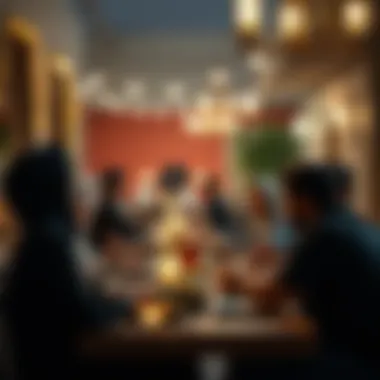
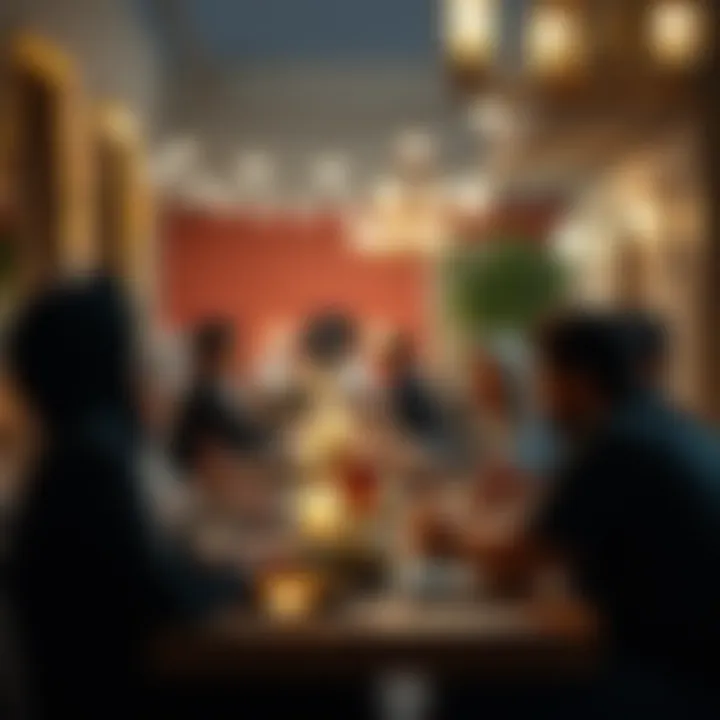
Influence of Expat Communities
The expat communities in Dubai offer a remarkable dynamic to the city’s iftar experience, not merely changing timing but also the very essence of meals. With a melting pot of cultures residing here, iftar is observed through various lenses.
- Cultural Celebrations: Expat groups often organize communal meals that feature foods from their home countries. This practice not only keeps their traditions alive but also invites others to sample different cuisines. In areas like Jumeirah, you might find vibrant gatherings of people sharing foods from South Asia to the Middle East, creating a reproductive culinary experience.
- Flexible Timing: Due to diverse work cycles and lifestyle choices, expatriates might break their fast at varying times—some extend it past sunset. This inclusion means that iftar can sometimes bleed into casual dinners shared among friends, thereby merging family traditions with contemporary lifestyles.
- Social Connections: Finally, there’s the influence on social ties. Iftar often acts as a catalyst for mingling. Expatriates may use the occasion to strengthen connections, inviting friends from different backgrounds to share meals that celebrate diversity.
These aspects demonstrate substantial impacts on how iftar is experienced in Dubai. Understanding these influences can enhance the appreciation and ritual surrounding the fast, making it uniquely fulfilling and comprehensive for anyone partaking in this holy month.
In summary, the regional and community variations in Dubai offer a rich canvas to experience iftar during Ramadan, making it a multifaceted celebration.
For further insights on cultural practices and nuances, consider visiting or local resources such as .
Practical Considerations for Iftar
Understanding the practical aspects of Iftar is essential, as it significantly enhances the overall experience during Ramadan. As the sun sets, the moment of breaking fast should be more than just a time to eat; it is a moment that embodies tradition and fellowship. It is important to grasp how to prepare for this occasion effectively.
How to Know the Exact Time for Iftar
Knowing the precise time for Iftar is crucial. Each day, the sunset varies slightly, making it essential for Muslims to rely on accurate information. Traditionally, people would observe the sunset with the naked eye, but today, this process has evolved.
- Local Mosques and Communities: The community mosques usually announce the Iftar time. They often have clocks visible to everyone, which might be synchronized with the local prayer times.
- Islamic Centers: Major centers, such as the Dubai Islamic Centre, compile accurate prayer times for the month of Ramadan and share them with the public, either on their websites or via flyers.
- Online Resources: Websites like IslamicFinder provide precise Iftar timings based on one’s specific location in Dubai. Using these resources can aid in making the most out of the Iftar experience.
Using Mobile Apps and Local Resources
In our fast-paced world, technology can streamline the process of finding out the Iftar timing. Many mobile applications cater specifically to this need, offering convenience at your fingertips. Examples include:
- Muslim Pro: A well-known app that not only offers prayer times but also includes features such as Quran readings and Islamic articles.
- iPray: It customizes prayer times based on user preferences and geographical location.
Apart from apps, local resources such as daily newspapers often print the Iftar timings. This dual approach of using both technology and traditional resources ensures that everyone in Dubai can stay informed.
Takeaway: In today’s diverse environment, combining old and new methods provides the best experience. Whether it’s your local mosque’s announcement or a notification from your favorite app, being punctual for Iftar enhances the significance of the evening.
Staying informed about the exact timing for Iftar fosters a sense of community and respect for the tradition. Hence, it's best for all, especially new residents or visitors, to utilize these resources for an enriched Ramadan experience.
Dining Options for Iftar
Exploring dining options for iftar in Dubai reveals a vibrant tapestry of cultural and culinary experiences. During Ramadan, the time to break fast isn't just about food; it's an occasion for connections, sharing, and celebration. The choices available are not just about satisfying hunger; they provide an insight into the cultural ethos of the community. Whether it's a fancy hotel buffet or a cozy local eatery, each venue offers something unique, enriching the overall experience.
Key elements underpinning the significance of iftar dining options include:
- Cultural Significance: Sharing a meal with family and friends enhances the bonds between individuals. It is hugely important in a diverse city like Dubai, where different cultures come together.
- Diverse Culinary Experiences: From traditional Arabic dishes to modern twists on old favorites, the variety is astonishing. It's a culinary journey through flavors that reflects not just regional tastes but global influences.
- Social Gathering: Iftar is often a communal affair, where people gather in large groups to foster a sense of togetherness. Many venues create an ambiance conducive to socializing, making dining during this period a festive experience.
- Considerations of Accessibility: With many options available, dietary preferences, including vegetarian and halal choices, need to be catered to. Numerous establishments provide a range of options to accommodate these preferences.
In sum, dining for iftar in Dubai is a multi-faceted experience, encompassing more than just food. It stands as a representation of community spirit and cultural exchange, making it a crucial aspect of Ramadan.
Popular Iftar Venues in Dubai
When it comes to selecting the perfect venue for iftar, Dubai boasts a plethora of options that cater to varied tastes and budgets. A few noteworthy mentions include:
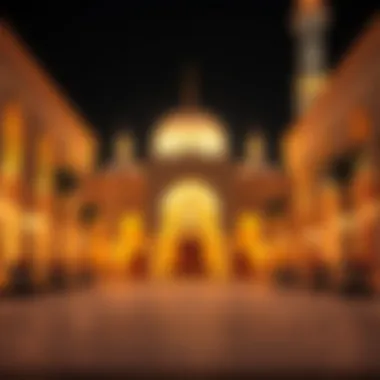
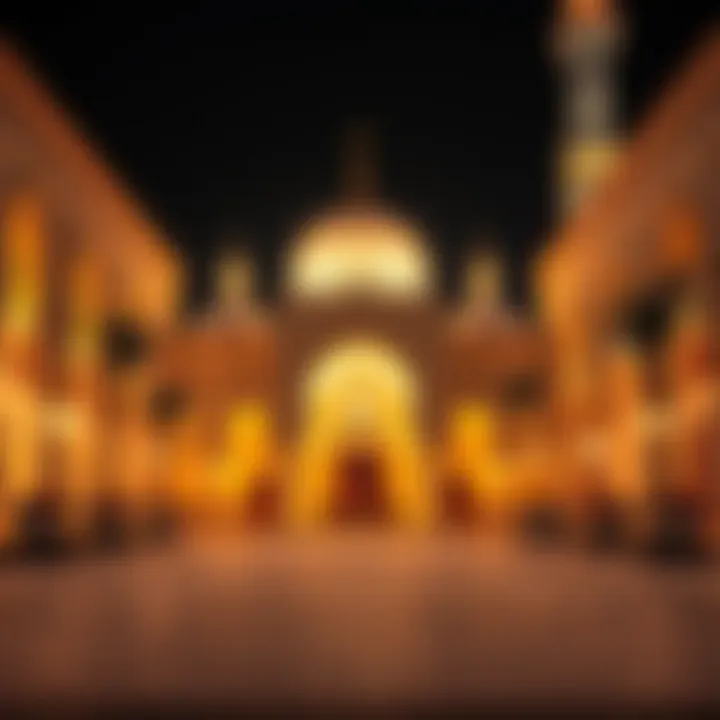
- Arabian Courtyard Hotel & Spa: Located in the historic Al Fahidi neighborhood, it offers an authentic Arabian buffet, rich in flavors and tradition. The ambiance is enhanced by decor reminiscent of ancient Dubai.
- Burj Al Arab: For those wishing to indulge, the Al Iwan restaurant provides opulent dining experience with breathtaking views. It is famous for its lavish buffet featuring a mix of traditional and international dishes.
- Al Mallah: A popular choice among locals, this Lebanese eatery serves quick but delicious iftar meals. Its shawarmas and fresh juices are particularly beloved during Ramadan.
- JW Marriott Marquis: This hotel presents an extensive iftar buffet, featuring a blend of Middle Eastern and Asian cuisines. With its classy setting, it’s perfect for families and social gatherings.
These venues not only showcase food but also the spirit of shared experience, making the moment more meaningful.
Cultural and Culinary Experiences
Dining during iftar in Dubai transcends just the act of eating. It embodies a spectrum of cultural expressions, culinary innovations, and communal bonds that define the very essence of Ramadan. Here are some paramount experiences that one can expect:
- Fusion Flavors: Many restaurants experiment during Ramadan. You might stumble upon kebab tacos or falafel burgers, showcasing a blend of cultures that makes dining an adventurous affair.
- Traditional Dishes: Specific foods hold significant importance during iftar. Items such as dates, lentil soup, and an array of sweets like kunafa and baklava are integral, often crafted with family recipes handed down through generations. This underscores not only flavors but stories behind each dish, connecting diners to their heritage.
- Community Events: Many venues host themed evenings that go beyond dining. Live cooking demonstrations, cultural music performances, and exhibitions reflect the community’s fabric and storytelling through food.
- Charity Meals: Some establishments encourage diners to contribute to charitable causes as part of their meal. It allows patrons to give back while enjoying their iftar, reinforcing the values of compassion and generosity.
"Food is not just about feeding our bodies, but feeding our souls and nurturing connections."
For further exploration of dining options during iftar in Dubai, consider referencing resources like Dubai Tourism or Time Out Dubai.
Community Practices During Iftar
The period of iftar in Dubai is not merely a time to break fast; it embodies the essence of community, connection, and festivity during the holy month of Ramadan. As the sun dips below the horizon, people gather, transforming everyday dining into a celebration rich with tradition and shared experience. This section explores the social dynamics and communal aspects that characterize iftar in Dubai, revealing how these practices deepen relationships and enhance cultural identity.
Family Gatherings and Community Events
During Ramadan, families in Dubai prioritize togetherness, and iftar becomes a revered opportunity for fostering familial bonds. When the call to prayer resonates, homes fill with the aroma of traditional dishes prepared with love.
Families often host large gatherings, welcoming not just immediate relatives but also friends and extended family. Shared plates overflowing with dates, lentil soup, and biryani signify more than just food; they serve as a conduit for storytelling and connection. For those in Dubai, these meals provide a sanctuary from the hustle of everyday life.
Moreover, community events play a crucial role in bringing people together. Many neighborhoods organize shared iftar meals in public parks or community centers. Such gatherings foster a spirit of unity, irrespective of background or nationality. It's common to see locals mingling with expats, exchanging cultural practices and culinary techniques that illuminate the diverse makeup of Dubai.
- Essence of Togetherness: These gatherings highlight the concept of ukhuwah, or brotherhood, central to Muslim values.
- Cultural Exchange: Sharing iftar with individuals from varied backgrounds enriches the experience, allowing for a blend of traditions on a single table.
- Building Relationships: For expats and locals alike, the communal iftar initiative cultivates friendships across boundaries and encourages a sense of belonging in this vibrant metropolis.
"In every shared meal, there’s an opportunity to learn, connect, and grow together."
Charitable Initiatives During Ramadan
Ramadan is also a period of reflection and giving. Charitable initiatives during iftar take on heightened significance, underlining the value of compassion and community service. Many families and organizations prepare meals to distribute to the needy, embodying the spirit of zakat, which emphasizes support for underprivileged members of society.
In Dubai, you’ll find mosques and community kitchens providing iftar meals free of charge to those who can’t afford it. This act ensures that regardless of one’s situation, everyone has the opportunity to partake in the iftar experience. Such initiatives not only satiate hunger but also nurture a sense of hope and belonging among those in need.
As the sun sets, volunteering during iftar becomes a cherished activity. Groups unite to prepare meals or deliver food parcels, reinforcing community ties.
- Collective Action: Numerous charity events rally volunteers from every walk of life, serving a shared goal of nurturing those around them.
- Food Drives: Initiatives such as food drives gather essential donations to help feed families and individuals throughout the month.
- Education on Giving: Charitable acts during Ramadan instill the importance of empathy and kindness, emphasizing teachings found in the Quran about helping others.
In a city as dynamic as Dubai, the community practices surrounding iftar are a tapestry woven from threads of love, education, and generosity. This blend not only enhances the experience of breaking fast but also invites deeper contemplation on the shared values that unite individuals within this bustling hub.
Epilogue
In summing up, understanding the timing and significance of iftar during Ramadan in Dubai is no small feat. It's more than just breaking the fast; it's a moment to reflect, rejoice, and reconnect with family and community. In this bustling metropolis, where tradition seamlessly intertwines with modernity, iftar serves as a focal point of the day, offering both sustenance and a sense of belonging.
Reflecting on the Iftar Experience
Reflecting on the iftar experience reveals layers of meaning that go far beyond the food on the table. The act of breaking fast is often accompanied by social gatherings, where families and friends come together to share not just a meal but also stories and laughter. This is particularly poignant in Dubai, where a melting pot of cultures converges. Many residents might find themselves enjoying traditional Arabic dishes alongside Indian curries or Western desserts, creating a culinary tapestry unique to this city.
The atmosphere is typically charged with a spirit of generosity and appreciation. People often prepare extra plates for neighbors or those less fortunate, turning meals into acts of charity. This ethos of community heralds the essence of Ramadan itself, which is about mindfulness, giving, and gratitude.
The Role of Iftar in Dubai's Cultural Landscape
The role of iftar in Dubai's cultural landscape cannot be overstated. Being in a city known for its towering skyscrapers and luxurious lifestyle, one might easily overlook the depth of tradition that exists alongside modernity. Iftar acts as a bridge, connecting the old with the new. Various community and cultural events are often organized around iftar, from open-air buffets in parks to lavish hotel feasts. These events reflect the city's dedication to preserving cultural practices while welcoming global influences. It’s also noteworthy how iftar gatherings have become a form of cultural exchange, where expats share their heritage through food, stories, and customs. This mutual understanding fosters a sense of unity among diverse communities living in Dubai.
In essence, the iftar experience, especially in a city like Dubai, facilitates not just a cultural narrative but also economic interactions, as restaurants and venues see increased patronage during this month.
Through thoughtful preparation, community engagement, and culinary diversity, iftar embodies the harmonious blend of tradition and modern life in Dubai, serving as a testament to the city’s vibrant soul and inclusive spirit.















